Introducing children to proper skin care practices from an early age is key to nurturing healthy skin that lasts a lifetime. As parents and caregivers, we hold the responsibility of instilling habits that promote skin health, confidence, and well-being in our children. This guide aims to provide comprehensive insights and practical advice on navigating the world of children's skincare, from understanding their unique skin needs to implementing gentle and effective routines. By fostering a nurturing environment and equipping children with the knowledge and tools to care for their skin, we empower them to embrace self-care and cultivate a lifelong commitment to healthy skin habits. Join Clinikally on this journey as we navigate the path to nurturing healthy, radiant skin in the next generation.
Setting the Foundation: Skincare Essentials for Kids

Ensuring proper skincare for children is essential for maintaining their overall health and well-being. Just as a solid foundation supports a structure, establishing a routine of skincare essentials lays the groundwork for healthy skin throughout their lives. From gentle cleansers to nourishing moisturisers and sun protection, these foundational products form the basis of a comprehensive skincare regimen tailored to children's unique needs. By instilling good habits early on, parents can help their children develop a lifelong commitment to caring for their skin and promoting a lifetime of healthy skin. Join us as we delve into the essentials of paediatric skincare, providing guidance and insights to support your child's skin health from infancy through adolescence.
Skincare essentials for children include gentle cleansers, moisturisers, sunscreen, and lip balm. These products are specifically formulated to suit children's delicate skin and address their unique skincare needs. Gentle cleansers help remove dirt, oil, and impurities without stripping the skin's natural oils, while moisturisers hydrate and nourish the skin, keeping it soft and supple. Sunscreen is crucial for protecting children's skin from harmful UV rays and preventing sunburn and long-term sun damage. Additionally, lip balm helps prevent chapped lips and keeps the delicate skin on the lips moisturised and protected. Choosing products with hypoallergenic and fragrance-free formulas is ideal for minimising the risk of irritation and sensitivity in children's skincare routines.
Choosing Safe and Gentle Products for Children
Choosing safe and gentle skincare products for children requires careful consideration of ingredients, formulations, and potential allergens. Here's how to select products that are suitable for children's delicate skin:
-
Check Ingredients: Look for products formulated with gentle, non-irritating ingredients that are suitable for children's sensitive skin. Avoid harsh chemicals, fragrances, dyes, and preservatives that can cause irritation or allergic reactions.
-
Opt for Hypoallergenic Formulas: Choose skincare products labeled as hypoallergenic, as they are less likely to cause allergic reactions or skin sensitivities. These products are formulated to be mild and gentle on sensitive skin.
-
Avoid Harsh Cleansers: Select mild, soap-free cleansers specifically formulated for children's delicate skin. Avoid products containing sulfates or harsh detergents, as they can strip the skin's natural oils and cause dryness or irritation.
-
Look for Moisturizing Ingredients: Choose moisturizers enriched with hydrating ingredients like glycerin, shea butter, or ceramides to keep children's skin moisturized and protected. These ingredients help maintain the skin's natural barrier and prevent dryness and irritation. Incorporating child-friendly moisturising practices is very crucial for keeping the skin plump and hydrated.
-
Sun Protection: Prioritize sunscreen with broad-spectrum protection and an SPF of 30 or higher for children's outdoor activities. Opt for mineral-based sunscreens containing zinc oxide or titanium dioxide, as they are less likely to cause irritation and provide effective UV protection.
-
Patch Test: Before using a new skincare product on your child's entire body, perform a patch test on a small area of skin to check for any adverse reactions or sensitivities.
-
Consult with Pediatricians or Dermatologists: If your child has specific skin concerns or conditions, such as eczema or allergies, consult with a pediatrician or dermatologist for personalized recommendations and guidance on suitable pediatric skincare products.
-
Read Reviews and Labels: Research products online and read reviews from other parents to gauge their effectiveness and safety for children. Pay attention to product labels and certifications indicating safety and suitability for children's use.
-
Skincare for different skin types in kids: It is recommended to tailor the skincare according to the skin type of kids. Using products containing shea butter and jojoba oil for dry skin, Fuller’s Earth for oily skin, etc. is hugely beneficial.
By following these tips and guidelines, parents can confidently choose safe and gentle skincare products that promote the health and well-being of their children's delicate skin.
The Importance of Sun Protection in Childhood
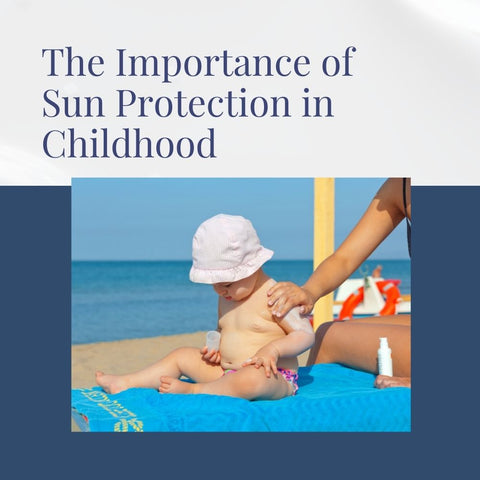
Sun protection in childhood is of utmost importance for several reasons:
-
Reducing the Risk of Sunburn: Children's delicate skin is more susceptible to sunburn than adult skin. Protecting them from the sun's harmful UV rays helps prevent painful sunburns, which can cause discomfort and increase the risk of skin damage.
-
Preventing Long-term Sun Damage: Sun exposure during childhood contributes to cumulative sun damage over time, increasing the risk of skin cancer, premature aging, and other skin concerns later in life. Shielding children from the sun's harmful UV radiation helps mitigate these risks and promotes long-term skin health. Preventing skin issues in childhood is the key to have a healthy skin in adulthood.
-
Minimizing the Risk of Skin Cancer: Excessive sun exposure, especially during childhood, is a significant risk factor for developing skin cancer later in life. By practicing sun protection habits early on, such as wearing sunscreen and protective clothing, parents can help reduce their children's risk of developing skin cancer as adults.
-
Preserving Skin Health and Appearance: Sun damage can lead to various skin issues, including wrinkles, age spots, and uneven skin tone. Protecting children's skin from the sun helps preserve its youthful appearance and maintain overall skin health.
-
Instilling Healthy Habits: Teaching children about the importance of sun protection instills lifelong habits that promote skin health and well-being. By establishing sun-safe practices early on, parents empower their children to take responsibility for their skin and prioritize sun protection throughout their lives.
Overall, sun protection in childhood is essential for safeguarding children's skin from sun damage, reducing the risk of skin cancer, and promoting long-term skin health and wellness. By prioritizing sun protection measures, parents can help ensure their children enjoy safe and healthy outdoor activities while minimizing the harmful effects of UV radiation.
Addressing Common Skin Conditions in Kids
Addressing common skin conditions in kids requires proactive care and understanding. From eczema to insect bites and for dealing with skin allergies in kids, here are a few key points:
-
Eczema: Keep skin moisturized and avoid triggers like certain fabrics.
-
Acne: Teach good skincare habits and avoid harsh products.
-
Rashes: Identify the cause and provide appropriate treatment, such as soothing creams.
-
Insect Bites: Apply cold compresses and anti-itch creams to alleviate symptoms.
-
Sunburns: Use cool compresses and aloe vera gel to soothe sunburned skin.
By staying informed and providing timely care, parents can help their children manage common skin issues effectively.
Building a Skincare Routine for Younger Skin

Building an effective but skincare routine for kids involves simplicity, gentle products, and consistency. Here's how to create a basic skincare routine tailored to children's needs:
-
Use a gentle, soap-free cleanser to wash their face once or twice daily. Look for mild formulations specifically designed for children's delicate skin. Sebamed Baby Gentle Wash is an ultra-mild, emollient and a soap free formula, suitable for daily wash of kids.
-
Apply a lightweight, non-comedogenic moisturizer to hydrate and protect their skin. Choose products with soothing ingredients like aloe vera or oat extract to help maintain skin barrier function. Cetaphil Baby Advanced Protection Cream With Organic Calendula is a multipurpose cream for kids.
-
Apply a broad-spectrum sunscreen with SPF 30 or higher before outdoor activities. BABE Pediatric Transparent Sunscreen Wet Skin SPF 50 is one such product.
-
For specific concerns like eczema or acne, use targeted treatments as directed by a pediatrician or dermatologist. These may include hydrocortisone cream for itching or benzoyl peroxide for acne.
-
Teach children about the importance of skincare habits, such as washing their face gently, applying sunscreen regularly, and avoiding harsh products. Encourage them to take ownership of their skincare routine as they grow older. Skincare education for young ones is very crucial as it may aid in inculcating healthy skin habits for kids later on.
-
Monitor their skin regularly for any changes or issues, such as dryness, redness, or irritation. Adjust their skincare routine as needed based on their skin's response and any feedback from healthcare professionals.
-
Be a role model by practising good skincare habits yourself. Children are more likely to adopt healthy behaviours when they see their parents prioritising self-care.
By incorporating these steps into a simple and consistent skincare routine, parents can help children develop lifelong habits for maintaining healthy, radiant skin.
Age-Appropriate Skincare Strategies for Children
Age-appropriate skincare strategies for children vary depending on their developmental stage and individual needs. Here's a general guideline for skincare strategies and paediatric dermatology tips tailored to different age groups:
|
Age Group |
Skincare Strategies |
|
Infants (0-2 years) |
- Use mild, fragrance-free baby soap for baths. |
|
- Apply a gentle moisturiser to prevent dryness. |
|
|
- Use diaper cream to protect against diaper rash. |
|
- Avoid sun exposure; dress in protective clothing. |
|
|
Toddlers & |
- Continue using gentle cleansers and moisturizers. |
|
Preschoolers (2-5) |
- Encourage regular handwashing with mild soap. |
|
- Introduce sunscreen with SPF 30+ for outdoor activities. |
|
- Teach basic skincare habits like gentle face washing. |
|
|
School-Age |
- Emphasize sun protection and outdoor safety. |
|
Children (6-12) |
- Use cleansers and moisturizers suitable for their skin. |
|
- Address specific skincare concerns with targeted treatments. |
|
- Encourage good hygiene practices like regular bathing. |
|
|
Adolescents |
- Establish a consistent skincare routine. |
|
(13-18) |
- Introduce acne-fighting products as needed. |
|
- Emphasize healthy lifestyle habits for skin health. - Educate about the risks of excessive sun exposure. |
These age-appropriate skincare routines and strategies such as acne care for preteens, sensitive skin solutions for kids etc. provide a guideline for parents to ensure proper care for their children's skin at different stages of development.
Certain top selling, dermatologist recommended brands that have great products for paediatric skin care as well are:
Natural and Hypoallergenic Options for Kids
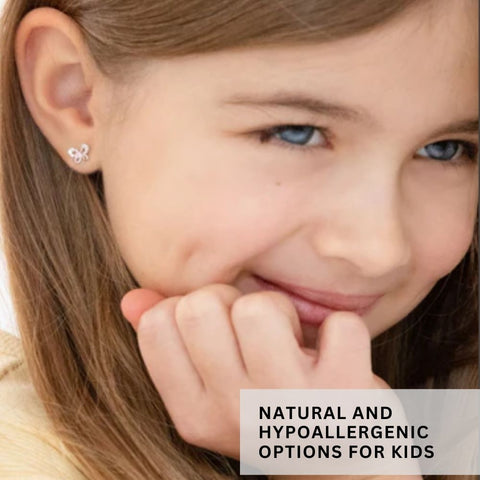
By selecting natural and hypoallergenic skin care options for kids, parents can minimise the risk of allergic reactions and irritation while effectively caring for their children's sensitive skin. Investing in safe skincare products for children is always a great idea for children’s skincare basics. Incorporating organic skincare for children in their routine can prove to be very beneficial.
- Cleansers: Look for gentle, fragrance-free cleansers formulated with natural ingredients like oatmeal, calendula, or chamomile. These ingredients are soothing and gentle on sensitive skin. Aveeno Daily Moisturizing Body Wash is one of the cleansers that is very gentle for sensitive skin and has Natural skincare ingredients for children.
- Moisturisers: Opt for hypoallergenic moisturisers enriched with natural emollients such as shea butter, coconut oil, or jojoba oil. These ingredients help hydrate and nourish the skin without causing irritation. Aveeno Baby Soothing Relief Moisture Cream and Sanosan Baby Milk Protein Care Cream are two such moisturisers.
- Sunscreen: Choose mineral-based sunscreens containing zinc oxide or titanium dioxide, which provide broad-spectrum protection without irritating sensitive skin. Look for formulas free from harsh chemicals, fragrances, and dyes. Cetaphil Sun Kids Very High Protection Liposomal Lotion SPF 50+ provides high protection and moisturisation which is very important for kids and sun protection makes the skincare regimen complete.
- Diaper Cream: Use natural diaper creams with soothing ingredients like zinc oxide, calendula, or coconut oil to protect against diaper rash and irritation. These creams create a barrier to moisture while calming and nourishing the skin. BABE Pediatric Nappy Rash Cream has an advanced repairing formula for infants and young children.
- Bath Products: Select hypoallergenic bath products made with gentle, plant-based ingredients such as aloe vera, lavender, or chamomile. These ingredients cleanse and hydrate the skin while minimizing the risk of allergic reactions. BABE Pediatric Bath Gel is a bath product suitable for kids and is formulated with a variety of botanical extracts. Introducing bath time skincare for children can prove to be a nice, fun way to make the children familiar with skincare products.
- Ointments and Balms: Consider natural ointments and balms formulated with botanical extracts like calendula or comfrey to soothe dry, irritated skin. These products provide relief for minor cuts, scrapes, and insect bites without harsh chemicals or fragrances. Managing childhood eczema and other skin conditions using the dermatologist recommended products is very crucial.
- Lip Balms: Choose natural lip balms made with ingredients like beeswax, shea butter, or cocoa butter to moisturise and protect children's lips. Avoid products containing artificial flavours or fragrances that may cause irritation. Instead use hypoallergenic skincare for kids.
- Hair Care: Opt for natural, hypoallergenic shampoos and conditioners formulated with gentle ingredients like coconut oil, aloe vera, or oat extract. These products cleanse and nourish the hair and scalp without stripping natural oils or causing irritation. BABE Pediatric Extra Mild Shampoo is suitable for the infants and kids as it nourishes and protects the delicate scalp.
Educating Kids on Skincare and Hygiene
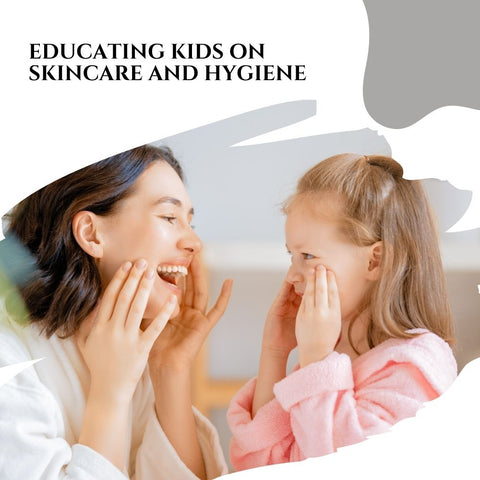
Educating kids about skincare and hygiene is essential for instilling good habits that will promote lifelong health and well-being. Here are some tips on how to effectively teach children about skincare and hygiene:
-
Lead by Example: Children learn by observing, so be a positive role model by practising good skincare and hygiene habits yourself. Let them see you washing your face, brushing your teeth, and applying sunscreen.
-
Make it Fun and Interactive: Turn skincare and hygiene routines into enjoyable activities by incorporating games, songs, or stories. Use colourful illustrations or educational videos to demonstrate proper techniques.
-
Use Age-Appropriate Language: Tailor your explanations to your child's age and level of understanding. Use simple language and avoid overwhelming them with too much information at once.
-
Set a Routine: Establish a consistent daily routine for skincare and hygiene activities, such as washing hands before meals, brushing teeth after meals, and applying sunscreen before going outdoors.
-
Explain the Why: Help children understand the reasons behind each skin care or hygiene task. For example, explain that washing hands removes germs that can make them sick or that applying sunscreen protects their skin from sunburn.
-
Encourage Independence: As children grow older, gradually give them more responsibility for their own skincare and hygiene routines. Teach them how to properly use products and tools, such as toothbrushes or sunscreen, and encourage them to do it themselves.
-
Be Patient and Encouraging: Learning new habits takes time, so be patient and supportive as your child develops their skincare and hygiene routines. Offer praise and positive reinforcement to reinforce good behaviours.
-
Answer Questions Honestly: Encourage children to ask questions about skincare and hygiene, and answer them honestly and age-appropriately. Address any concerns or misconceptions they may have and provide accurate information.
-
Use Teachable Moments: Take advantage of everyday situations to teach children about skincare and hygiene. For example, use mealtime to talk about the importance of washing hands before eating or use a trip to the beach to discuss the need for sunscreen.
By incorporating these strategies into your approach, you can effectively educate children about skincare and hygiene in a positive and engaging way, setting them up for a lifetime of healthy habits.
Long-term Skincare: Fostering Healthy Habits from a Young Age
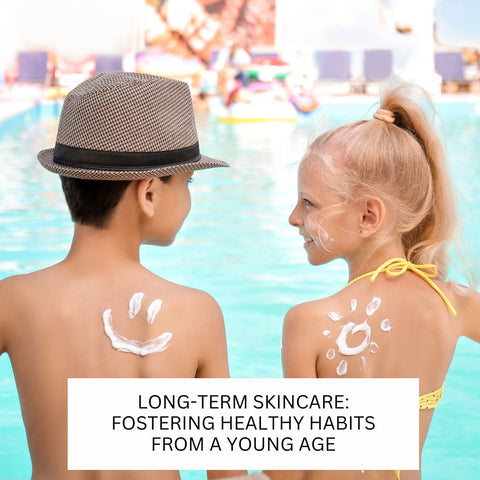
Long-term skincare begins with fostering healthy habits from a young age, instilling routines that prioritise skin health and well-being. By teaching children the importance of proper cleansing, moisturising, and sun protection, we lay the foundation for a lifetime of radiant and resilient skin. Through consistent education, positive reinforcement, and leading by example, we empower the next generation to embrace skincare as an integral part of overall health, ensuring they enjoy the benefits of healthy skin throughout their lives.
Instilling Routine and Consistency in Kids' Skincare
Instilling routine and consistency in kids' skincare is crucial for promoting healthy habits that will benefit them for years to come. By establishing a daily skincare regimen that includes cleansing, moisturising, and sun protection, children learn the importance of self-care and personal hygiene from an early age. Consistency reinforces these habits, making them second nature and instilling a sense of responsibility for their own well-being. Through gentle guidance and positive reinforcement, parents can help children develop a lifelong commitment to caring for their skin, ensuring it remains healthy and radiant throughout their lives.
Coping with Skin Sensitivities and Allergies in Children
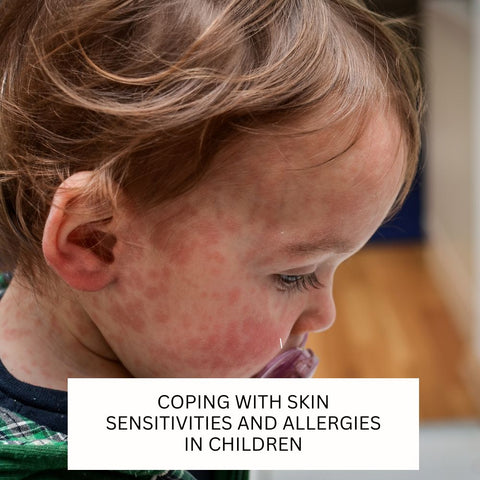
By implementing certain coping strategies, parents and caregivers can help alleviate discomfort and minimise the impact of skin sensitivities and allergies on children's skin health and quality of life that may occur due to certain products.
|
Coping Strategies |
Description |
|
Identify Triggers |
Determine specific allergens or irritants that trigger skin reactions in children. |
|
Allergen Avoidance |
Take steps to minimise exposure to known allergens, such as certain foods or plants. |
|
Patch Testing |
Conduct patch tests to identify potential allergens in skincare products or fabrics. |
|
Gentle Skincare Routine |
Implement a gentle skincare regimen using hypoallergenic products and fragrance-free formulations. |
|
Moisturise Regularly |
Keep the skin well-hydrated with gentle, fragrance-free moisturisers to prevent dryness and irritation. |
|
Cool Compresses |
Apply cool compresses to soothe itching and inflammation associated with skin sensitivities. |
|
Consult Healthcare Professionals |
Seek guidance from paediatricians or dermatologists for proper diagnosis and management of skin sensitivities and allergies. |
|
Medication or Treatment |
In severe cases, healthcare professionals may prescribe medication or recommend specialised treatments to manage skin conditions. |
Preventive Skin Care Measures for Long-Term Health
Preventive skin care measures are essential for long-term skin health and vitality. Here are some key strategies to maintain healthy skin over time:
-
Sun Protection: Consistently apply broad-spectrum sunscreen with SPF 30 or higher to shield the skin from harmful UV rays and prevent sun damage, premature ageing, and skin cancer.
-
Hydration: Keep the skin hydrated by drinking plenty of water and using moisturisers with hydrating ingredients like hyaluronic acid, glycerin, or ceramides to maintain skin elasticity and prevent dryness.
-
Gentle Cleansing: Use mild, soap-free cleansers to cleanse the skin and remove dirt, oil, and impurities without stripping away its natural oils or causing irritation.
-
Healthy Diet: Maintain a balanced diet rich in fruits, vegetables, lean proteins, and essential fatty acids to provide the skin with essential nutrients and antioxidants that promote skin health from within.
-
Avoid Smoking and Excessive Alcohol: Smoking and excessive alcohol consumption can deplete the skin of oxygen and vital nutrients, leading to premature ageing, dullness, and wrinkles. Avoiding these habits can help maintain youthful and radiant skin.
-
Stress Management: Practise stress-reducing techniques such as meditation, yoga, or deep breathing exercises to minimise the effects of stress on the skin, such as inflammation and breakouts.
-
Regular Exercise: Engage in regular physical activity to improve blood circulation, boost oxygen and nutrient delivery to the skin cells, and promote a healthy complexion.
-
Quality Sleep: Prioritise getting enough sleep each night, as inadequate sleep can disrupt the skin's natural repair processes and lead to dullness, dark circles, and premature ageing.
-
Avoid Harsh Products: Choose skincare products with gentle formulations free from harsh chemicals, fragrances, and irritants that can strip the skin's natural barrier and cause sensitivity or inflammation.
-
Regular Skin Checks: Conduct regular self-examinations to monitor for any changes in moles, freckles, or other skin lesions, and seek professional evaluation if you notice any concerning signs or symptoms.
By incorporating these preventive skincare measures into your daily routine, you can help maintain the long-term health, youthfulness, and vitality of your skin, ensuring a radiant complexion for years to come.
Empowering the Next Generation Through Skincare Education

Empowering the next generation through skincare education is essential for cultivating a culture of self-care, confidence, and well-being. By imparting knowledge about proper skin care practices, children and young adults can develop lifelong habits that promote healthy skin and overall health. Through education, they learn to value and respect their bodies, understand the importance of sun protection, hydration, and gentle skincare routines, and become advocates for their own well-being. As we equip them with the tools and knowledge to care for their skin, we empower them to navigate the complexities of skincare with confidence and resilience, ensuring they thrive not only in their outward appearance but also in their inner sense of self-worth and self-care. By investing in skincare education today, we pave the way for a brighter, healthier future for generations to come.
































